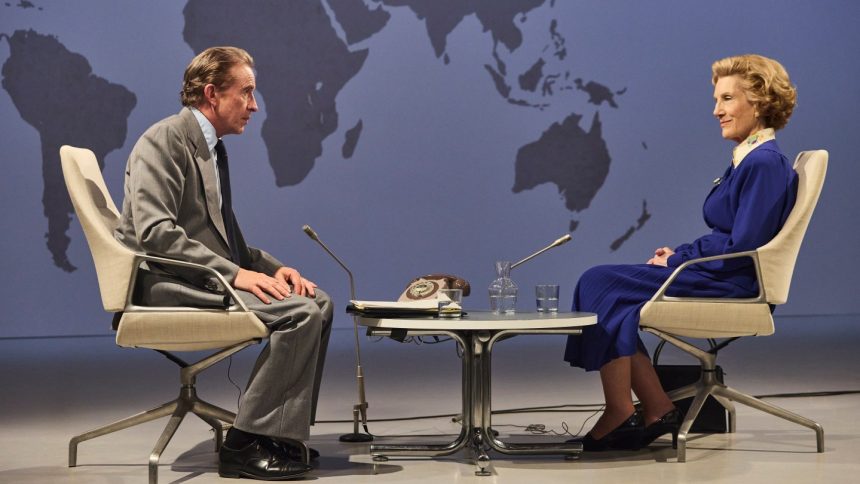‘Brian and Maggie’ Review: Steve Coogan and Harriet Walter Shine in PBS’ Stephen Frears-Directed Drama About a Pivotal Margaret Thatcher Interview
Brian and Maggie, PBS‘ Stephen Frears-directed dramatization of the famously contentious 1989 interview of U.K. Prime Minister Margaret Thatcher by broadcast journalist Brian Walden, ends with a caption: “Following their final encounter, in-depth political TV interviews have faded from our screens.”
Unsaid but understood is the notion that we’re all the poorer for this fact. “Now it’s all breakfast TV bollocks: cozy chit-chats on the sofa, five minutes long, questions unanswered, politicians spouting their own agendas,” a character sighs in a scene set circa 1986. It’s hard to argue things have gotten much better in the age of viral TikToks and Truth Social edicts.
But if the James Graham-written two-parter serves as a nostalgic tribute to a bygone era of TV journalism, it’s made both less uplifting and more interesting by its acknowledgment that the good old days weren’t always so perfect and straightforward, either. Though that now-legendary sit-down serves as the centerpiece of this series (which first aired in the U.K. on Channel 4 earlier this year), its true subject is the knotty relationship between the two participants, which straddled an often uncomfortably blurry line between professional regard and personal friendship.
By the time Brian (Steve Coogan) and Maggie (Harriet Walter) have their notorious 45-minute chat, teased in the opening minutes of episode one and partly re-enacted in the second half of episode two, they’ve been doing this for over a decade. Their first interview comes in 1977, shortly after Brian pivots from politics into journalism with the encouragement of David Cox (Tom Mothersdale), a TV producer struck by the fact that, unlike the blue-blooded, Eton-educated types populating so much of the media, Brian hails from a working-class Midlands family. As Cox puts it to him: “You sound like our audience.”
You Might Also Like
The modest background is something Brian shares with Margaret. Though she’s a staunch Tory and he’s nominally a supporter of Labour, they connect over their faith in meritocracy and their distaste for social services they see as “handouts.” She enjoys that he asks her serious questions. He finds it refreshing that she engages earnestly with them. His boss grumbles that he’s going too easy on her, while her aide warns not to trust him too much. Each is nevertheless charmed by the other, forming a relationship that’s portrayed a bit like an illicit affair.
Which, really, it is, though not in the romantic or sexual sense. Rather, it’s one in which they bond off the clock and off the record over glasses of whiskey, away from the disapproving eyes of their colleagues. It’s one in which she borrows phrasing from his interviews (“Victorian values”) to promote herself, and he writes glowing newspaper columns about her strength and vision. At a particularly queasy point, he agrees to write her a speech in the run-up to the 1983 general election, without disclosing to either his bosses or his audience that he’s no longer just reporting on her campaign but helping to shape it.
At less than two hours of total run time, Brian and Maggie only has so much space to plumb the intricacies of Thatcher’s term in office, or its impact on wider British and global society. The culture of the time is conveyed prettily but broadly, through wonderfully detailed sets (by production designer Christina Moore) and costumes (by costume designer Gabriela Yiaxis) and occasional montages of soldiers or stockbrokers or punk rockers. When a minor character reflects late in the series that thanks to Thatcher, “we used to have communities, and now we just have stuff,” he probably has a point, but in the context of this series his complaint lands as so vague it’s essentially meaningless.
The drama is more persuasive at showing us how its two leads evolve. As the decade trudges on, Brian becomes more serious about his work, never losing his soft spot for Margaret but otherwise gaining a sterling reputation as a hard-hitting interview. She becomes the country’s longest-serving prime minister in a century and grows ever more stubborn in her opinions, to the aggravation of her cabinet — including her chancellor, Nigel Lawson (Ivan Kaye), who eventually resigns in 1989 over their disagreements about monetary policy.
Coogan is very good as Brian, capturing the push-pull between ambition and ambivalence over the course of his career. But it’s Walter (Succession) who truly stuns, managing to humanize the Iron Lady’s fears and frustrations without softening her unduly.
Brian and Maggie touches only lightly on the misogyny underlying critiques of Thatcher as a woman increasingly “off her trolley,” acknowledging it without digging into it in any illuminating or satisfying manner. But it captures the whiff of condescension in even Brian’s impassioned attempts to defend her in the press, where he speculates that her ill temper and stubbornness might be “there to mask a deep loneliness within.”
It all comes to a head in that live interview, conducted days after Nigel’s shocking resignation. Brian repeatedly demands answers for the chancellor’s departure. Margaret parrots over and over her line about how “unassailable” Nigel was while deflecting blame for his decision. Neither relents, and eventually each accuses the other on camera of being “domineering.”
It must have been, at the time, riveting stuff — a rigidly controlled politician backed into a corner by a journalist who refuses to let her wriggle out from under his scrutiny — and indeed, from the show’s telling, it was this appearance that helped hasten the end of her premiership the following year.
Is Brian and Maggie a cautionary tale about the dangers of getting too close to your subject? A round of applause for a reporter who stuck to his guns even at the cost of a dear friendship? A wistful sigh for bygone days when a politician might actually feel obligated to subject herself to such an ordeal?
I suspect the answer to all of those questions is yes. I also suspect all of those themes would have landed more forcefully had the show borrowed a bit of Brian’s doggedness, and interrogated its own intentions with a bit more rigor.







